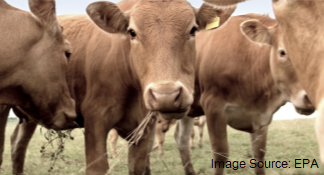The Washington Post reports that feeding cows a certain kind of seaweed could make them burp less methane. The seaweed is a red/crimson color grass that’s found all over the world. It’s scientific name is Asparagopsis. It is called limu kohu in Hawaiian.
Normally when cows eat and chew their cud, the grass ferments in one of their 4 stomachs and that process makes methane, a potent greenhouse gas. The cows then burp and fart the methane. The Washington Post articles notes that the U.N. Food and Agriculture Organization says that methane from cow digestion is about 6% of all greenhouse gases. Some researchers think cows are one of the main sources of increasing methane in the last 20 years, according to a report by CNN.
Mixing dried powdered Asparagopsis into cows feed can reduce methane by as much as 98%, according to the Washington Post article. It takes less than 1% of a cow’s feed to have beneficial effects.
It might also allow cows to grow faster or make more milk, which might allow farmers use less feed. That would also help reduce greenhouse gases, since tractors and harvesters use fuel to produce animal feed.
This is great news, since there are 1.5 billion cows in the world!
Read the Washington Post article here. It has more details about the discovery, which compound in the seaweed is so helpful to cows, and how that compound works to make a difference. There’s also a good 2-minute video about cows and methane.
11/30/2020





